10th Anniversary Celebration Concert and Gala
An all star lineup of CMSPB favorite guest artists Mendelssohn and Bruch Octets

Featured Artists
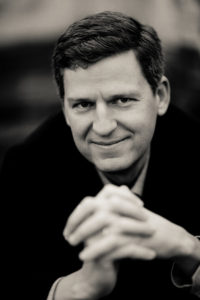
James Ehnes has established himself as one of the most sought-after violinists on the international stage. Gifted with a rare combination of stunning virtuosity, serene lyricism and an unfaltering musicality, Ehnes is a favourite guest of many of the world’s most respected conductors including Ashkenazy, Alsop, Sir Andrew Davis, Denève, Elder, Ivan Fischer, Gardner, Paavo Järvi, Mena, Noseda, Robertson and Runnicles. Ehnes’s long list of orchestras includes, amongst others, the Boston, Chicago, London, NHK and Vienna Symphony Orchestras, the Los Angeles, New York, Munich and Czech Philharmonic Orchestras, and the Cleveland, Philadelphia, Philharmonia and DSO Berlin orchestras.
Recent orchestral highlights include the MET Orchestra at Carnegie Hall with Noseda, Gewandhausorchester Leipzig with Shelley, San Francisco Symphony with Janowski, Frankfurt Radio Symphony with Orozco-Estrada, London Symphony with Harding, and Munich Philharmonic with van Zweden, as well as his debut with the London Philharmonic Orchestra at the Lincoln Center in spring 2019. In 2019/20, Ehnes is Artist in Residence with the Dallas Symphony Orchestra, which includes performances of the Elgar Concerto with Luisi, a play/direct programme leg by Ehnes, and a chamber music programme. In 2017, Ehnes premiered the Aaron-Jay Kernis Violin Concerto with the Toronto, Seattle and Dallas Symphony Orchestras, and gave further performances of the piece with the Deutsches Symphonie-Orchester and Melbourne Symphony Orchestra.
Alongside his concerto work, James Ehnes maintains a busy recital schedule. He performs regularly at the Wigmore Hall, Carnegie Hall, Symphony Center Chicago, Amsterdam Concertgebouw, Ravinia, Montreux, Chaise-Dieu, the White Nights Festival in St Petersburg, Verbier Festival, Festival de Pâques in Aix, and in 2018 he undertook a recital tour to the Far East, including performances in Hong Kong, Shanghai, Singapore and Kuala Lumpur. As part of the Beethoven celebrations, Ehnes has been invited to perform the complete cycle of Beethoven Sonatas at the Wigmore Hall throughout 2019/20. Elsewhere Ehnes performs the Beethoven Sonatas at Dresden Music Festival, Prague Spring Festival, the Concertgebouw Amsterdam, at Aspen Music Festival (as part of a multi-year residency) and at Bravo Vail Festival during his residency week also including the Violin Concerto and Triple Concerto with the Dallas Symphony Orchestra and Runnicles. In 2016, Ehnes undertook a cross-Canada recital tour, performing in each of the country’s provinces and territories, to celebrate his 40th birthday.
As a chamber musician, he has collaborated with leading artists such as Andsnes, Capucon, Lortie, Lugansky, Yo-Yo Ma, Tamestit, Vogler and Yuja Wang. In 2010, he formally established the Ehnes Quartet, with whom he has performed in Europe at venues including the Wigmore Hall, Auditorium du Louvre in Paris and Théâtre du Jeu de Paume in Aix, amongst others. Ehnes is the Artistic Director of the Seattle Chamber Music Society.
Ehnes has an extensive discography and has won many awards for his recordings, including a Grammy Award (2019) for his live recording of Aaron Jay Kernis’ Violin Concerto with the Seattle Symphony and Ludovic Morlot, and a Gramophone Award for his live recording of the Elgar Concerto with the Philharmonia Orchestra and Sir Andrew Davis. His recording of the Korngold, Barber and Walton violin concertos won a Grammy Award for ‘Best Instrumental Soloist Performance’ and a JUNO award for ‘Best Classical Album of the Year’. His recording of the Paganini Caprices earned him universal praise, with Diapason writing of the disc, “Ehnes confirms the predictions of Erick Friedman, eminent student of Heifetz: ‘there is only one like him born every hundred years’.” Recent releases include sonatas by Beethoven, Debussy, Elgar and Respighi, and concertos by Walton, Britten, Shostakovich, Prokofiev and Strauss, as well as the Beethoven Violin Concerto with the Royal Liverpool Philharmonic Orchestra and Andrew Manze, which was released in October 2017 (Onyx Classics).
Ehnes began violin studies at the age of five, became a protégé of the noted Canadian violinist Francis Chaplin aged nine, and made his orchestra debut with L’Orchestre symphonique de Montréal aged 13. He continued his studies with Sally Thomas at the Meadowmount School of Music and The Juilliard School, winning the Peter Mennin Prize for Outstanding Achievement and Leadership in Music upon his graduation in 1997. He is a Fellow of the Royal Society of Canada and in 2010 was appointed a Member of the Order of Canada. Ehnes was awarded the 2017 Royal Philharmonic Society Award in the Instrumentalist category.
James Ehnes plays the “Marsick” Stradivarius of 1715.
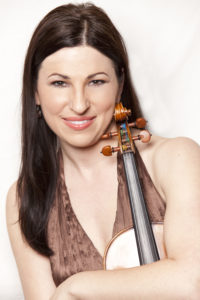 Amy Schwartz Moretti has a musical career of broad versatility that spans nearly two decades. Former Concertmaster of the Oregon Symphony and Florida Orchestra, Amy has served as guest concertmaster for the symphony orchestras of Houston, Pittsburgh, Atlanta, CityMusic Cleveland, New York Pops and Hawaii Pops, and the festival orchestras of Brevard, Colorado and Grand Teton. Director of the McDuffie Center for Strings since its inception in the Mercer University Townsend School of Music, Ms. Moretti has developed the Fabian Concert Series and holds the Caroline Paul King Chair in Strings. A performing artist with an affinity for chamber music, Amy maintains an active schedule of solo, chamber and concertmaster appearances and is a member of the Ehnes Quartet. She has recorded for Chandos, Harmonia Mundi, Onyx Classics, CBC Records, BCMF/Naxos and Sono Luminus. The Cleveland Institute of Music has recognized her with an Alumni Achievement Award and she is the 2014 San Francisco Conservatory of Music Fanfare Honoree, their first Precollege graduate to be recognized. Born in Wisconsin, raised in North Carolina and California, Amy lives in Georgia with her husband and two sons, enjoying all aspects of motherhood, especially their soccer and tennis activities. Recent performances include appearances at the Rome Chamber Music Festival, ChamberFest Cleveland, Les Rencontres Musicales d’Evian, Music@Menlo, Seattle Chamber Music Society, and Bridgehampton Chamber Music Festivals. (amyschwartzmoretti.com)
Amy Schwartz Moretti has a musical career of broad versatility that spans nearly two decades. Former Concertmaster of the Oregon Symphony and Florida Orchestra, Amy has served as guest concertmaster for the symphony orchestras of Houston, Pittsburgh, Atlanta, CityMusic Cleveland, New York Pops and Hawaii Pops, and the festival orchestras of Brevard, Colorado and Grand Teton. Director of the McDuffie Center for Strings since its inception in the Mercer University Townsend School of Music, Ms. Moretti has developed the Fabian Concert Series and holds the Caroline Paul King Chair in Strings. A performing artist with an affinity for chamber music, Amy maintains an active schedule of solo, chamber and concertmaster appearances and is a member of the Ehnes Quartet. She has recorded for Chandos, Harmonia Mundi, Onyx Classics, CBC Records, BCMF/Naxos and Sono Luminus. The Cleveland Institute of Music has recognized her with an Alumni Achievement Award and she is the 2014 San Francisco Conservatory of Music Fanfare Honoree, their first Precollege graduate to be recognized. Born in Wisconsin, raised in North Carolina and California, Amy lives in Georgia with her husband and two sons, enjoying all aspects of motherhood, especially their soccer and tennis activities. Recent performances include appearances at the Rome Chamber Music Festival, ChamberFest Cleveland, Les Rencontres Musicales d’Evian, Music@Menlo, Seattle Chamber Music Society, and Bridgehampton Chamber Music Festivals. (amyschwartzmoretti.com)
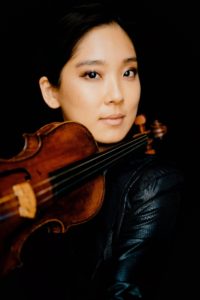 Praised by the San Francisco Chronicle as being “fresh, different and exhilarating” and Strings Magazine as “intensely wrought and burnished“, violinist Grace Park captivates audiences with her artistry, passion and virtuosity. Winner of the Naumburg International Violin Competition, she is one of the leading artists of her generation.
Praised by the San Francisco Chronicle as being “fresh, different and exhilarating” and Strings Magazine as “intensely wrought and burnished“, violinist Grace Park captivates audiences with her artistry, passion and virtuosity. Winner of the Naumburg International Violin Competition, she is one of the leading artists of her generation.
Ms. Park’s upcoming season includes her Carnegie Hall debut performing Barber's violin concerto at Stern Auditorium. She will also make recital appearances at the Schubert Club, Krannert Center, Weill Recital Hall, and Merkin Concert Hall, and giving her Mexico debut with the Mexico City Philharmonic.
This past year, Ms. Park recorded her first solo album with the Prague Philharmonia and their music director, Emmanuel Villaume, which will include concertos and solo works of Mozart and Dvorak. It is set to be released in the fall of 2022.
Ms. Park has appeared as soloist, recitalist, and chamber musician throughout the United States, Europe, Asia, and Canada at venues such as Walt Disney Hall, The Kennedy Center, The Rudolfinum in Prague, Schubert Club, Metropolitan Museum of Art, and Jordan Hall. She has performed and participated in festivals such as Music @ Menlo, IMS Prussia Cove, Festival Mozaic, Yellowbarn, and Perlman Music Program, where she has performed with many of today's celebrated artists.
A devoted and passionate educator, Ms. Park is an alumnus of Carnegie Hall’s Ensemble Connect and has taught masterclasses and coached at Conservatorio de Musica de Cartagena, Mannes School of Music, Festival Mozaic, Arkansas University, Washington and Lee University, North Dakota State University, and Skidmore College.
As a native to Los Angeles, California, Ms. Park began violin at the age of 5 where she trained at the Colburn School of Music. She continued her studies at Colburn Conservatory and New England Conservatory for her Bachelor and Master of Music degrees. Principle teachers are Donald Weilerstein, Miriam Fried, Sylvia Rosenberg, and Robert Lipsett. She now resides in New York City.
Ms. Park plays on a 1717 Andreas Guarneri generously on loan from an anonymous patron.
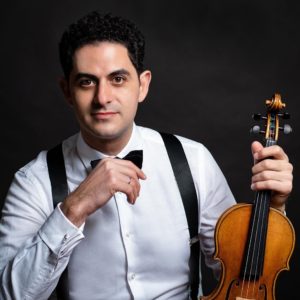
Winner of a 2009 Avery Fisher Career Grant, Arnaud Sussmann has distinguished himself with his unique sound, bravura, and profound musicianship. Minnesota’s Pioneer Press writes, “Sussmann has an old-school sound reminiscent of what you’ll hear on vintage recordings by Jascha Heifetz or Fritz Kreisler, a rare combination of sweet and smooth that can hypnotize a listener.”
A thrilling musician capturing the attention of classical critics and audiences around the world, he has recently appeared as a soloist with the Mariinsky Orchestra under Valery Gergiev, the Vancouver Symphony, and the New World Symphony. As a chamber musician, he has performed at the Tel Aviv Museum in Israel, London’s Wigmore Hall, Lincoln Center’s Alice Tully Hall, the White Nights Festival in Saint Petersburg, the Dresden Music Festival in Germany, and the Phillips Collection in Washington, DC. He has been presented in recital in Omaha on the Tuesday Musical Club series, New Orleans by the Friends of Music, and at the Louvre Museum in Paris.
An alum of CMS’s Bowers Program, Sussmann is Artistic Director of the Chamber Music Society of Palm Beach, Co-Director of Music@Menlo’s International Program, and teaches at Stony Brook University.
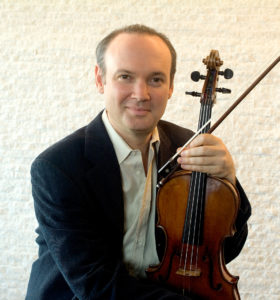 Violist Paul Neubauer's exceptional musicality and effortless playing led the New York Times to
Violist Paul Neubauer's exceptional musicality and effortless playing led the New York Times to
call him “a master musician.” He recently made his Chicago Symphony subscription debut with conductor Riccardo Muti and his Mariinsky Orchestra debut with conductor Valery Gergiev. He also gave the US premiere of the newly discovered Impromptu for viola and piano by Shostakovich with pianist Wu Han. In addition, his recording of the Aaron Kernis Viola Concerto with the Royal Northern Sinfonia was released on Signum Records and his recording of the complete viola and piano music by Ernest Bloch with pianist Margo Garrett was released
on Delos. Appointed principal violist of the New York Philharmonic at age 21, he has appeared as soloist with over 100 orchestras including the New York, Los Angeles, and Helsinki philharmonics; National, St. Louis, Detroit, Dallas, San Francisco, and Bournemouth symphonies; and Santa Cecilia, English Chamber, and Beethovenhalle orchestras. He has premiered viola concertos by Bartók (revised version of the Viola Concerto), Friedman, Glière, Jacob, Kernis, Lazarof, Müller-Siemens, Ott, Penderecki, Picker, Suter, and Tower and has been featured on CBS's Sunday Morning, A Prairie Home Companion, and in Strad, Strings, and People magazines. A two-time Grammy nominee, he has recorded on numerous labels including Decca, Deutsche Grammophon, RCA Red Seal, and Sony Classical and is a member of SPA, a trio with soprano Susanna Phillips and pianist Anne-Marie McDermott. Mr. Neubauer is the artistic director of the Mostly Music series in New Jersey and is on the faculty of The Juilliard School and Mannes College.
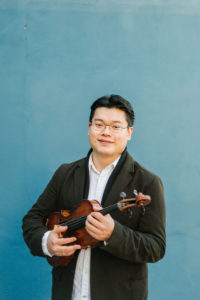 Award-winning violist Brian Chen is a founding member of the Formosa Quartet. After winning First Prize in the 2003 Primrose International Viola Competition, he and his quartet won the Grand Prize of the 2006 London International String Quartet Competition. San Diego Union-Tribune described him as an artist who finds "not just the subtle emotion, but the humanity hidden in the music." He has recorded on EMI, Delos, New World Records, and Aeolian Classics. His recording with the Formosa Quartet, From Hungary to Taiwan, released by Bridge Records, was named one of "The Best Classical Releases of January 2019" by WQXR. As an orchestral musician, he served as principal violist of the San Diego Symphony and the Mainly Mozart Festival Orchestra and has appeared as guest principal viola with major orchestras across North America. His solo, chamber, and orchestral career, combined with his passion for education, led him to found the Formosa Chamber Music Festival in Taiwan together with his quartet. He is a former member of CMS’s Bowers Program. His other chamber music projects include Camera Lucida and The Myriad Trio. He has given master classes across North America and Asia and served on the faculty of the University of Southern California until 2019. Chen joined the UCLA Herb Alpert School of Music as professor of viola in 2018.
Award-winning violist Brian Chen is a founding member of the Formosa Quartet. After winning First Prize in the 2003 Primrose International Viola Competition, he and his quartet won the Grand Prize of the 2006 London International String Quartet Competition. San Diego Union-Tribune described him as an artist who finds "not just the subtle emotion, but the humanity hidden in the music." He has recorded on EMI, Delos, New World Records, and Aeolian Classics. His recording with the Formosa Quartet, From Hungary to Taiwan, released by Bridge Records, was named one of "The Best Classical Releases of January 2019" by WQXR. As an orchestral musician, he served as principal violist of the San Diego Symphony and the Mainly Mozart Festival Orchestra and has appeared as guest principal viola with major orchestras across North America. His solo, chamber, and orchestral career, combined with his passion for education, led him to found the Formosa Chamber Music Festival in Taiwan together with his quartet. He is a former member of CMS’s Bowers Program. His other chamber music projects include Camera Lucida and The Myriad Trio. He has given master classes across North America and Asia and served on the faculty of the University of Southern California until 2019. Chen joined the UCLA Herb Alpert School of Music as professor of viola in 2018.
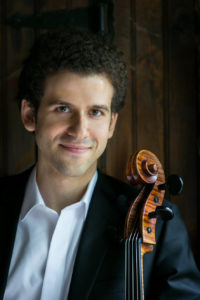
Hailed by The New Yorker as a “superb young soloist,” Nicholas Canellakis has become one of the most sought-after and innovative cellists of his generation, captivating audiences throughout the United States and abroad. In The New York Times his playing was praised as “impassioned … the audience seduced by Mr. Canellakis’s rich, alluring tone.”
Canellakis’s recent highlights include concerto appearances with the Albany, Delaware, Lansing, and Bangor Symphonies, the Erie Philharmonic, The Orchestra Now, and the New Haven Symphony as Artist-in-Residence; Europe and Asia tours with the Chamber Music Society of Lincoln Center, including appearances in London’s Wigmore Hall, the Louvre in Paris, the Seoul Arts Center, and the Shanghai and Taipei National Concert Halls; and recitals throughout the United States with his long-time duo collaborator, pianist-composer Michael Brown. He made his Carnegie Hall concerto debut with the American Symphony Orchestra in 2015.
Canellakis is an artist of the Chamber Music Society of Lincoln Center, in which he performs regularly in Alice Tully Hall and on tour. He is also a regular guest artist at many of the world’s leading music festivals, including Santa Fe, Ravinia, Music@Menlo, Bard, Bridgehampton, La Jolla, Hong Kong, Moab, Music in the Vineyards, and Saratoga Springs. In addition, he was recently named Artistic Director of Chamber Music Sedona, in Arizona.
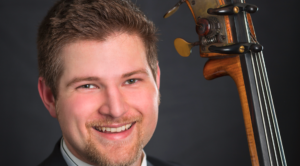 Bassist Blake Hinson joined the New York Philharmonic in 2012 after a two-year appointment as Principal Bass of the Grand Rapids Symphony. Previously, he played with the New World Symphony as a fellow and performed with The Philadelphia Orchestra. A native of West Des Moines, Iowa, Mr. Hinson was accepted at age 16 to The Curtis Institute of Music, where he studied with Philadelphia Orchestra Principal Bass Harold Robinson and Edgar Meyer. He spent three summers at the Aspen Music Festival and School on fellowship, where he played in the Aspen Chamber Symphony and Aspen Festival Orchestra and won the 2006 low strings competition. Mr. Hinson won third prize in the 2009 International Society of Bassists Double Bass Competition and made his solo debut at Boston’s Symphony Hall.
Bassist Blake Hinson joined the New York Philharmonic in 2012 after a two-year appointment as Principal Bass of the Grand Rapids Symphony. Previously, he played with the New World Symphony as a fellow and performed with The Philadelphia Orchestra. A native of West Des Moines, Iowa, Mr. Hinson was accepted at age 16 to The Curtis Institute of Music, where he studied with Philadelphia Orchestra Principal Bass Harold Robinson and Edgar Meyer. He spent three summers at the Aspen Music Festival and School on fellowship, where he played in the Aspen Chamber Symphony and Aspen Festival Orchestra and won the 2006 low strings competition. Mr. Hinson won third prize in the 2009 International Society of Bassists Double Bass Competition and made his solo debut at Boston’s Symphony Hall.
Mr. Hinson has taught at the Richard Davis Bass Foundation weekend, has coached the New York Youth Symphony bass section, and served as a clinician for Manhattan Concert Productions at Carnegie Hall.
About The Music

By the age of 20, Max Bruch (1838-1920) was captivating German audiences as a budding opera composer, and for the next sixty years, he built his sterling reputation on his many works for choir and individual voices. But modern audiences tend not to know of Bruch’s vocal roots, given the outsize influence of a handful of scores he wrote for soloist and orchestra: Kol Nidrei for cello, the Scottish Fantasy for violin, and above all the First Violin Concerto.
When the 82-year-old Bruch reworked a recent attempt at a quintet into the Octet for Strings in 1920, it had been a full sixty years since he had published any chamber music besides duets with piano accompaniment. He died later that year, and other than an unheralded radio broadcast in 1937, the Octet was out of the public eye until the score was finally published for the first time in 1996.
Bruch’s Octet never stood a chance at the time of its origins anyway, in that cynical age after the carnage of World War I when Stravinsky, Schoenberg, Bartok and others pulled musical traditions apart at the seams, each in their own disruptive ways. Bruch was writing in an idiom deeply influenced by Brahms, with an eye turned back to Mendelssohn and Schumann, those keepers of the Classical flame. Bruch’s melodies are as hummable as you’d expect from a musician whose first teacher was a singer (his own mother), and the string textures are rich and lucid, never getting muddied up by the profusion of inner voices. Mendelssohn’s seminal Octet exerts an undeniable influence, and there is a lovely symmetry in hearing these two works comingle—one from a teenage firebrand, the other from a sentimental octogenarian, both of them keen students of music’s past.
© 2023 Aaron Grad.

Growing up in a privileged family of bankers in Berlin, Felix Mendelssohn (1809-1847) often played chamber music at home with the best young musicians in the city. Piano was his primary instrument, but he could comfortably handle violin and viola parts as well, thanks to his years of study with Eduard Rietz, a prodigy who became the concertmaster of the Berlin court orchestra at 17.
In 1825, the 16-year-old Mendelssohn gave his friend and teacher a most precious birthday present: the Octet for Strings (Op. 20). The German composer Louis Spohr had published a work for two string quartets earlier that year, and Mendelssohn might have been aware of it, but his approach in the Octet was wholly original, treating it as one unified ensemble instead of two opposing groups. The orchestral grandeur of the music is apparent from the outset, with the first violinist rising over a saturated bed of slurred tremolos and pulsing off-beats. It would be easy for this profusion of textures to get messy and clouded, but Mendelssohn’s lucid orchestration only intensifies the deft progress through the customary sonata form, a structure dispatched with the fluidity of Bach and the rigor of Beethoven.
To counter the robust first movement, the Andante establishes a consoling tone, its sparing themes steeped in old church harmonies and resonant drones. For the lighter-than-air Scherzo, which must be played “always pianissimo and staccato,” Mendelssohn found inspiration in a dreamy episode from Goethe’s Faust. Some of that music crops up again in the manic finale, a contrapuntal wonder made possible by the young composer’s years of practice in the neglected art of fugue writing.
© 2023 Aaron Grad.
CMSPB does not discriminate on the basis of race, gender, creed, ethnicity, religion, sexual orientation, age or disability and we are a 501(c)(3) nonprofit organization.
Site maintained by Teller | © 2020-2022 Chamber Music Society of Palm Beach | All rights reserved.
